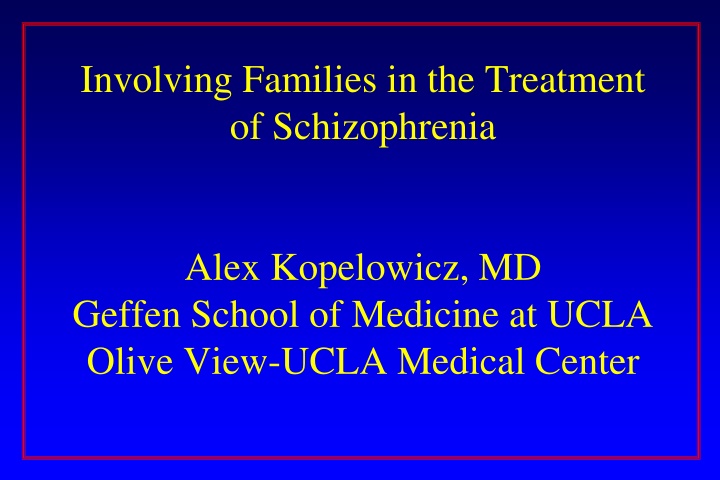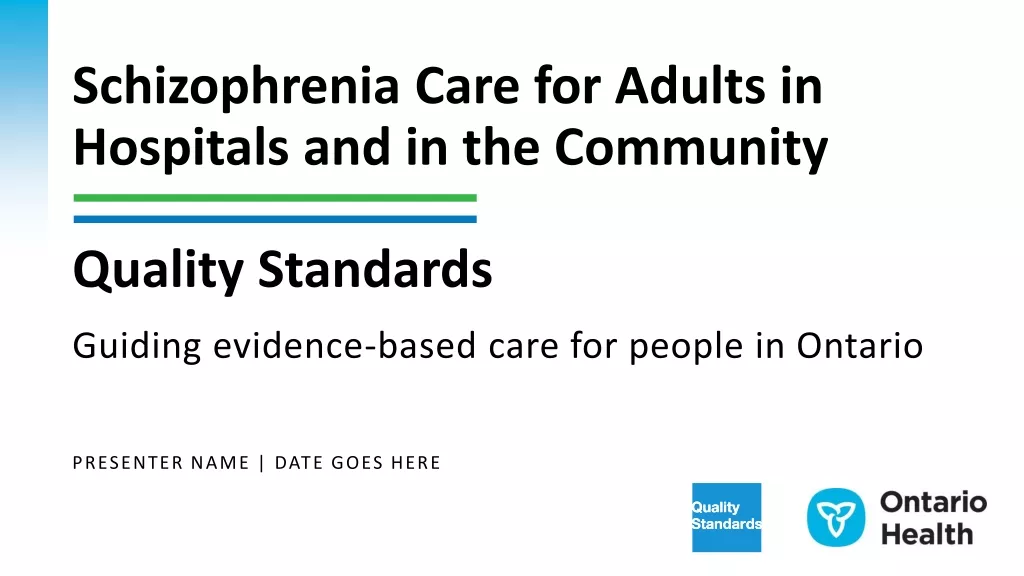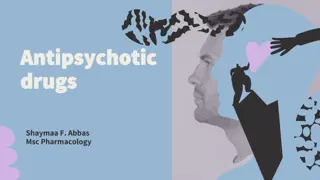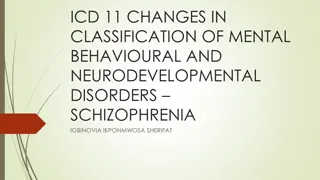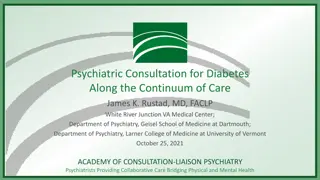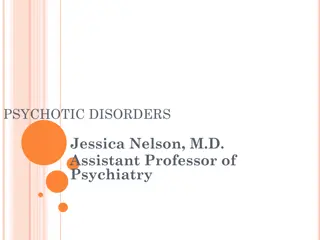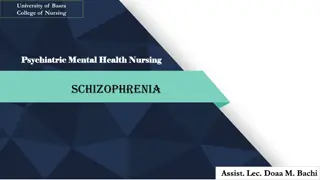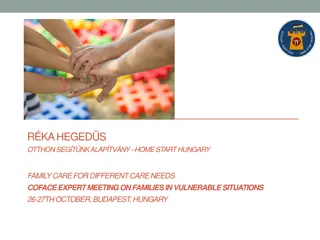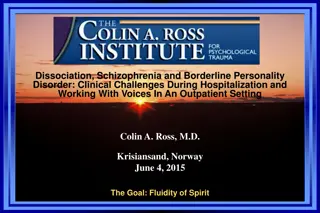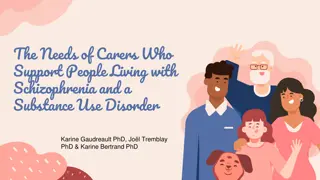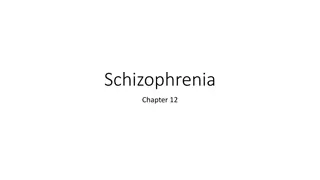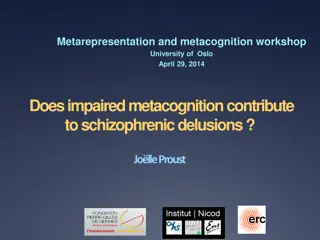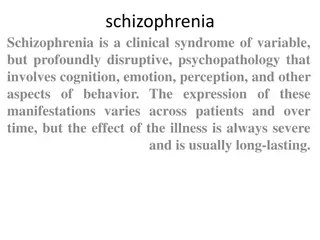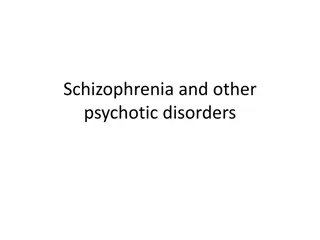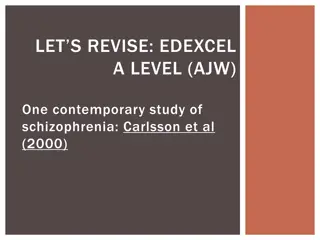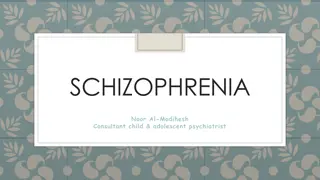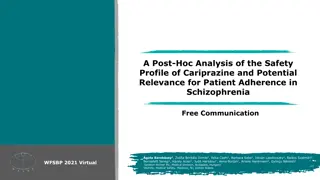Involving Families in Schizophrenia Treatment
Families play a crucial role in the treatment of schizophrenia, supporting recovery through psychosocial interventions, medication management, and skill-building. Evidence-based treatments focus on recovery, including illness management training and social problem-solving models to improve social skills and reduce relapse rates. Meta-analyses demonstrate the effectiveness of skills training in enhancing social adjustment and reducing hospitalizations. Individuals with schizophrenia can benefit from illness self-management skills to identify warning signs, manage symptoms, and navigate medication issues.
Download Presentation

Please find below an Image/Link to download the presentation.
The content on the website is provided AS IS for your information and personal use only. It may not be sold, licensed, or shared on other websites without obtaining consent from the author.If you encounter any issues during the download, it is possible that the publisher has removed the file from their server.
You are allowed to download the files provided on this website for personal or commercial use, subject to the condition that they are used lawfully. All files are the property of their respective owners.
The content on the website is provided AS IS for your information and personal use only. It may not be sold, licensed, or shared on other websites without obtaining consent from the author.
E N D
Presentation Transcript
Involving Families in the Treatment of Schizophrenia Alex Kopelowicz, MD Geffen School of Medicine at UCLA Olive View-UCLA Medical Center
Psychobiological Vulnerability Socioenvironmental Stressors PROTECTIVE FACTORS Continuity of Services Therapeutic & Supportive Relationships Psychotropic Medication Skill Building Family Support & Problem Solving Supported & Transitional Employment Supported & Transitional Housing Assertive Community Treatment RECOVERY STABLE RECURRENT RELAPSES REFRACTORY CLINICAL PROGRESS & OUTCOMES Symptoms & Relapse Cognitive Impairments Social Functioning Quality of Life
Evidence Based Treatments are focused on Recovery: PORT recommendations Standardized pharmacological treatment Illness management skills training Family psychoeducation Supported employment Assertive community treatment Integrated dual disorders treatment Kreyenbuhl et al., Schiz Bulletin 2010
Illness Management Training The social problem-solving model focuses on improving impairments in information processing that are assumed to be the cause of social skills deficits The model targets domains needing changes including medication and symptom management. Each domain is taught as part of a module, with the purpose of correcting deficits in receptive, processing, and sending skills.
Meta-Analysis of 75 Studies of Skills Training in Schizophrenia Improvement in Social Skills Self-rating Behavioral Performance Generalization of Skills Maintenance and Durability Naturalistic Situations Social Adjustment Higher Rate of Hospital Discharge Reduced Relapse Rates Heinssen, Liberman & Kopelowicz, 2000
Illness Self-Management Skills Identify the Warning Signs of Relapse Manage these Signs and Use them to Enlist Help Cope with Persistent Symptoms Avoid Alcohol and Illicit Drugs Obtaining information about Antipsychotic Medication Knowing Correct Self-Administration of Medication Identifying Side Effects of Medication Negotiating Medication Issues with Healthcare Providers
Module: Medication Self-Management Skill Area: Negotiating Medication Issues Requisite behaviors: Pleasant greeting Describe problem specifically Tell length of occurrence Describe extent of discomfort Specifically request action Repeat/clarify advice/orders Ask about expected time for effect Thank for assistance Good eye contact Good posture Clear, audible speech
Demonstrate the skills using video
Role play using video
Coaching with Positive Reinforcement
Skills Training for Latinos with Schizophrenia (Kopelowicz et al 2003) 93 stable outpatients with schizophrenia and their key relatives Randomly assigned to 3 months of skills training and customary care or CC only 13 weeks of group skills training, 4 days per week, 1 hour per day (Illness Management) Family involvement included 13 weekly sessions and 2 home visits
Number of Rehospitalizations 14 12 10 8 SST & FI Customary 6 4 2 0 9 months 15 months Kopelowicz et al 2003
Path model of relationship among treatment, knowledge, generalization and relapse .60 (.09)* .59 (.08)* Knowledge Treatment Relapse .32 (.08)* -.34 (.10)* Generalization Kopelowicz et al. Schizophrenia Bulletin 29:211-227, 2003
Better outcomes in family psychoeducation Over 20 controlled clinical trials, comparing to standard outpatient treatment, have shown: Much lower relapse rates and rehospitalization Up to 75% reductions of rates; minimally 50% Increased employment At least twice the number of consumers employed, and up to four times greater--over 50% employed after two years--when combined with supported employment Improved family relationships and well-being Reduced friction and family burden Reduced medical illness in family members Doctor visits for family members decreased by over 50% in one year Dixon et al 2003
Standard Approaches to Family Treatment in Severe Mental Illness Psychoeducation Communication skills training Problem solving techniques Social network development (MFG)
Stages of a Multifamily Group (McFarlane, 2004) Ongoing MFG Families & patients bi-weekly for 1 year Educa- tional workshop Joining Family and patient separately 3-6 weeks Families only 1 day
Psychoeducational Workshop Symptoms and Clinical Presentation The Causes of the Disorder Treatments and Rehabilitation The Importance of Family Participation
MULTIFAMILY GROUPS Five to Eight Families Two Clinicians 1 -Hour Sessions Biweekly 1 Year Minimum Refreshments/Snacks are provided Initial Sessions avoid emphasis on clinical issues Initial Sessions emphasize establishing a working alliance by building group identity and developing a sense of mutual interest and concern. Drop outs are Failures
PROBLEM SOLVING IN MFGs The CORE of MFG Sessions Designed to compensate Information-Processing Deficits in Schizophrenia FORMAT: Checking in Go-round Selecting a Problem to Solve Solving the Problem Wrap-up Socializing Clinicians should GET READY and HAVE A PLAN IN ADVANCE 15 Minutes 20 Minutes 5 Minutes 45 Minutes 5 Minutes
The key question is: How should we incorporate cultural factors to engage Latino families in the psychoeducation approach?
The Mediating Role of Culture Culture is the specific value orientations, belief systems, or sets of practices of a given group Culture resides both in the individual and in the social group Culture is a dynamic and creative process that is constantly changing through a person s interactions with the social world
The Assessment of Culture Best undertaken by paying attention to people s daily routines and how such activities are tied to families, social networks and communities The key to a cultural assessment is asking what matters most to people or what is most at stake for people
Cultural Modifications Necessary for Latino Families Encourage participation of fathers Acknowledge folk conceptions of illness Reframe to fit family beliefs and attitudes Focus on education rather than strictly on communication/problem solving skills Acknowledge each family member s role Goal: Interdependence vs independence Utilize prosocial EE factors (warmth)
Cultural Adaptation of MFG to Mexican-Americans Objectives To increase utilization of professional mental health services To improve treatment adherence
Application of Theory of Planned Behavior to MFG Approach Attitudes Client s assumptions about mental illness and the benefits of treatment are targeted Subjective Norms Centrality of the family for decision making points to the need to encourage families to actively participate in treatment plan Perceived Behavioral Control External locus of control requires the utilization of problem solving techniques to overcome financial and transportation obstacles
MFG for Mexican-Americans with Schizophrenia (Kopelowicz et al 2012) 174 poorly adherent patients (80% inpatients) with schizophrenia and their key relatives Randomly assigned to 12 months of MFG-A, MFG-S or customary care (1 year follow up) All groups conducted in Spanish, bi-weekly for 90 minutes each session MFG-A focused on adherence and based on Theory of Planned Behavior (Azjen 1991)
Adherence to Medication 60% 50% 40% A C S 30% 20% 10% 0% 4 8 12 18 24 Month
Time to Hospitalization Time to Hospitalization 100% 90% 80% % Not Rehospitalized 70% 60% A A S S C C 50% 40% 30% 20% 10% 0% 0 1-4 5-8 9-12 13-18 19-24 Months After Baseline Overall log-rank 2=13.3, df=2, p=.001. A vs S: 2=8.0, p=.005. A vs C: 2=11.4, p=.001. S vs C: 2=0.2, p=0.62. Pairwise Wald tests from PH model, all df=1.
HOSPITALIZATION MFG-A B=-0.29 (0.07), p<.0001 ADHERENCE B=-0.108 (0.021) p<0.0001 B=0.91 (0.26), p=0.0005 HOSPITALIZATION MFG-A B=-.19 (0.072) p=.0085 Mediation Analysis of Treatment Effect on Adherence and Hospitalization N=174. Sobel: -2.94, p=.003 (34% of the MFG-A-HOSPITALIZATION association)
CHANGE IN ATTITUDES a1 b1 CHANGE IN SUBJECTIVE NORMS b2 a2 c ADHERENCE MFG-A a3 b3 CHANGE IN PERCEIVED BEHAVIORAL CONTROL Paths Parameters SE Mediation 95% CI a1 b1 1.12 0.78 0.13 0.03* Attitudes 0.15 -0.05-0.39 Subjective Norms a2 b2 1.32 0.65* 0.11 0.03* 0.15 0.02-0.37 Perceived Behavioral Control VISIT & BASELINE TPB a3 b3 1.61 0.71* 0.02 0.03 0.03 -0.06-0.18 *p<0.05
Rates of Conformance with PORT Psychosocial Treatment Recommendations 100% 90% 80% 70% 60% 50% 40% 30% 20% 10% 0% Case Family Therapy Voc Rehab Management APA Office of Quality Improvement and Psychiatric Services, 2003
Conclusions As investigators give a voice to the family, either through quantitative research, qualitative research or experience working in that community, they are more likely to be successful in engaging families in the treatment process. Engagement is not a fixed entity. It is an iterative process in which clinical investigators engage the client and his/her family and continually evaluate their efforts. Incorporating the family in a culturally appropriate fashion within routine clinical settings would improve access to treatment, integration of care and ultimately, clinical outcomes for Latinos with serious mental disorders.
